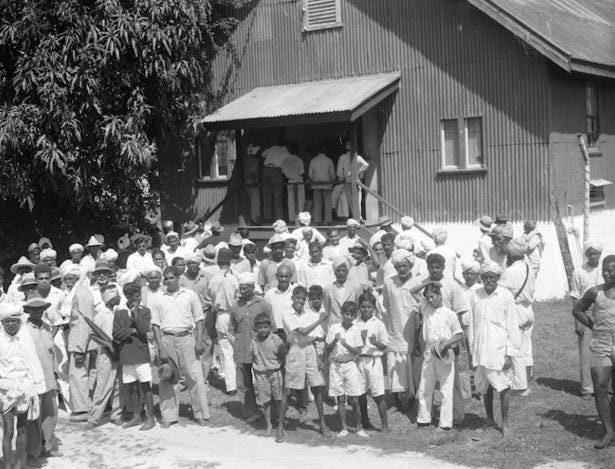Media shorthand defines Fiji as a place of smiling, friendly natives confronted, thanks to British colonialism, by aggressive intruders from India. The Indians are erroneously portrayed as insular and awkward with an unhelpful attitude against mixed race marriage and an unwillingness to accept Pacific culture. Indians were late on the scene, forced by economic circumstances to move from one part of the British Empire to another.
London ran Fiji as an ethnic museum, anxious not to change the habits and customs of the indigenous people, and wanting to avoid trouble over land. Fiji never had any strategic or imperial significance to Britain and the grand civilising mission was left to missionaries. But Fiji was suitable for one of the great global cash crops, sugar. It was labour intensive and Britain did not want Fijians working in it, preferring that their way of life be preserved. With slavery's abolition, the only alternative was to use indentured labour.
On 14 May 1 879, the ship Leonidas arrived at Nukulau Island on the eastern side of Suva, with 497 people from India's Uttar Pradesh. Between May 1879 and November 1916 around 45,439 Indians served 90 days in quarantine on that small island. They signed a contract and it was a corruption of that word which gave the workers their name: 'girmitiya'. The pay and conditions on the mostly Australian-owned sugar plantation 'lines' or rows of barracks ranged from poor to brutal, and they were grim. The Indian Government had insisted that for every 100 men sent to Fiji, 40 women should also go. The arrangement was not maintained, leading to troubled lives. Violence was often meted out on the workers. Most intended to return to India after five years, but many could not. For some, crossing kala pani or black water had resulted in a loss of caste and identity and little prospect of making economic lives for themselves back in India.
Indenture ended in 1920 and the mills bought cane from Indians who farmed land leased for up to 99 years from Fijian owners. Better than the indenture, it contained a fatal flaw: neither farmer nor owner negotiated directly on a fair price. The dealing was carried out by the NLTB which took a cut from the rent. Fijian landowners seldom received true market worth, a problem which continues still.
Keep reading with a 7-day free trial
Subscribe to Michael Field's South Pacific Tides to keep reading this post and get 7 days of free access to the full post archives.




